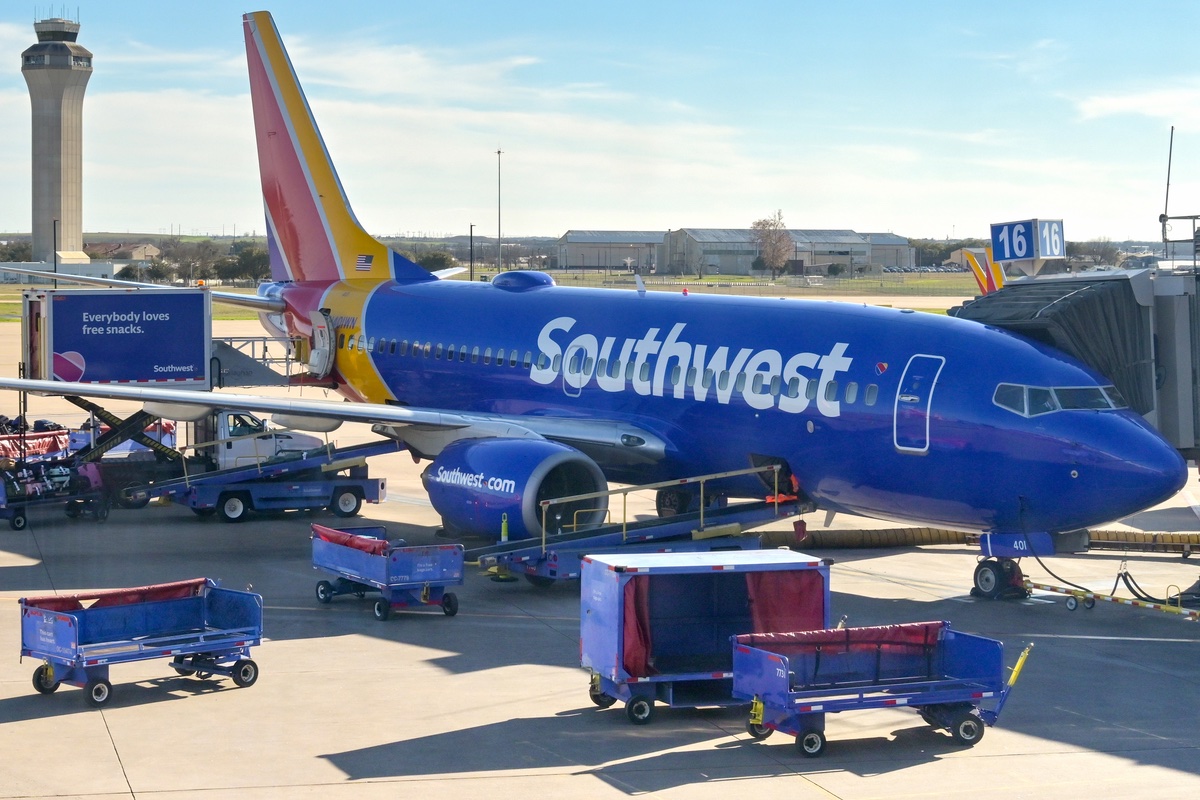Southwest Airlines Profit Falls 42%, but Carrier Says Travel Demand Is Stabilizing
Southwest Airlines Profit Falls 42%, but Carrier Says Travel Demand Is Stabilizing
By
Rachel Steinberg
Last updated:
July 24, 2025
First Published:
August 6, 2025

Photo: Skift
Southwest Airlines reported a sharp 42% drop in second-quarter net income on Wednesday, as it continues to navigate a sluggish domestic travel market and higher operational costs. While the airline fell short of Wall Street expectations for both earnings and revenue, executives remained optimistic, pointing to stabilizing travel demand and unveiling a $2 billion stock repurchase program as a vote of confidence in its long-term strategy.
Earnings Miss and Revenue Decline
According to consensus estimates from LSEG, Southwest’s adjusted earnings per share (EPS) for Q2 came in at 43 cents, below the 51 cents analysts had expected. Revenue totaled $7.24 billion, also underperforming against expectations of $7.3 billion, and marking a 1.5% year-over-year decline.
- Net income: $213 million (or 39 cents per share), down from $367 million last year
- Adjusted earnings: $230 million (or 43 cents per share), down 38% YoY
- Passenger revenue per seat mile (PRASM): $14.10, compared to $14.19 expected (StreetAccount)
Economic Uncertainty, Travel Weakness Weigh on Outlook
Earlier this year, in April, Southwest pulled its 2025 financial guidance, citing broader economic uncertainty and persistent weakness in domestic coach-class travel, which forms the bulk of its passenger base. CEO Bob Jordan acknowledged last month that heavy fare discounting was necessary during the summer travel season—traditionally the busiest period for the airline industry.
To cope with lower-than-expected demand, the carrier is reducing off-peak flight schedules, a move echoed by several U.S. airlines.
Looking ahead, Southwest forecasts third-quarter unit revenue—a key indicator of pricing power—could range from a 2% decline to a 2% increase compared to the same period in 2024.
New Business Strategy and Operational Shifts
In response to shifting consumer behavior and competitive pressure, Southwest is undergoing a strategic overhaul of its long-standing policies. The airline, which has long differentiated itself with perks like two free checked bags and open seating, announced plans this week to introduce assigned seating and new boarding procedures starting later this year.
Additionally, the airline launched basic economy fares in May, aimed at price-sensitive travelers. However, sales through the company’s own website underperformed initially, causing a 0.5-point drag on Q2 unit revenue, and are expected to knock another full point off unit revenue in Q3.
While these changes are designed to modernize the airline’s offerings and broaden its appeal, some analysts caution that altering core elements of Southwest’s identity could pose risks in customer retention.
Buyback Program Signals Confidence Amid Transition
Despite financial setbacks, Southwest’s board authorized a $2 billion share repurchase plan, signaling internal confidence in the company’s long-term strategy. Share buybacks often aim to boost shareholder value and suggest management believes the stock is undervalued.
The announcement may also serve as a stabilizing signal to investors concerned about the airline’s ability to adapt in a volatile and evolving travel market.
While Southwest Airlines continues to wrestle with post-pandemic economic headwinds, rising costs, and a reshaping competitive landscape, signs of stabilizing demand and a proactive approach to business transformation suggest the carrier is laying groundwork for a recovery. The coming quarters will be critical in proving whether these strategic shifts can reignite profitability and rebuild investor trust.
Popular articles
Subscribe to unlock premium content
Disney’s Timeless Magic and How the Entertainment Giant Continues to Shape Culture and Innovation

Imran Khan’s Economic Missteps Amid Political Chaos in Pakistan

The Philippines’ Digital Shift How Remittances and BPO Are Fueling Growth

Disney’s Timeless Magic and How the Entertainment Giant Continues to Shape Culture and Innovation

Imran Khan’s Economic Missteps Amid Political Chaos in Pakistan

Disney’s Timeless Magic and How the Entertainment Giant Continues to Shape Culture and Innovation









